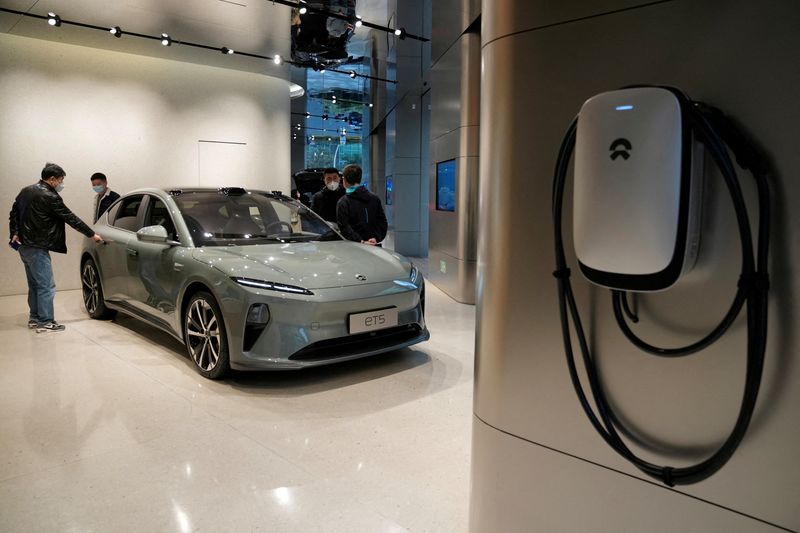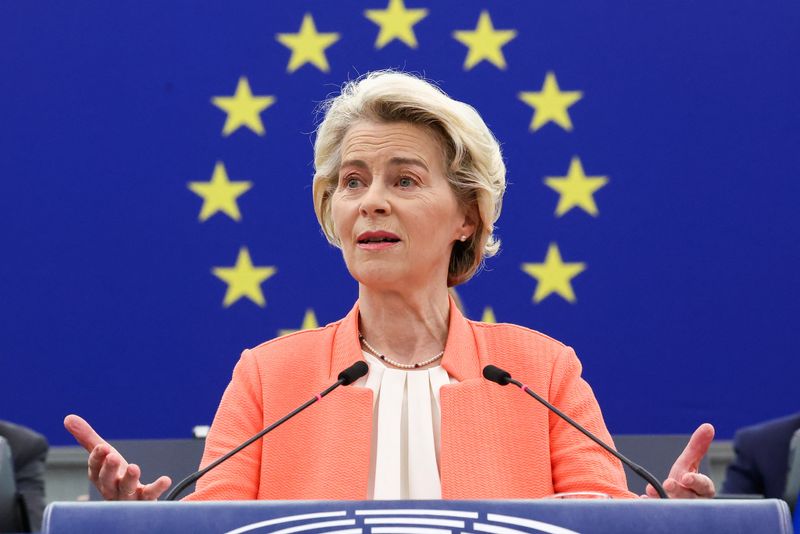By Philip Blenkinsop
BRUSSELS (Reuters) -The European Commission launched an investigation on Wednesday into whether to impose punitive tariffs to protect European Union producers against cheaper Chinese electric vehicle (EV) imports it says are benefiting from state subsidies.
"Global markets are now flooded with cheaper electric cars. And their price is kept artificially low by huge state subsidies," European Commission President Ursula von der Leyen said in her annual address to the bloc's parliament, seen by many in Brussels as a pitch for her re-appointment for a second term.
The Commission will have up to 13 months to assess whether to impose tariffs above the standard 10% EU rate for cars in its highest profile case against China since an EU probe into Chinese solar panels narrowly avoided a trade war a decade ago.
The anti-subsidy investigation covers battery-powered cars from China, so also includes non-Chinese brands made there, such as Tesla (NASDAQ:TSLA), Renault (EPA:RENA) and BMW (ETR:BMWG). It is also unusual in that it is brought by the European Commission itself, rather than in response to an industry complaint.
The Chinese Chamber of Commerce to the EU said it was very concerned and opposed to the investigation's launch and that the sector's competitive advantage was not due to subsidies. It urged the EU to look at Chinese electric vehicles objectively.
Tensions between China and the EU have been growing, partly due to Beijing's closer ties with Moscow after Russia's invasion of Ukraine. The EU is seeking to reduce its reliance on the world's second-largest economy, particularly for materials and products needed for its green transition.
European carmakers have realised they have a fight on their hands to produce lower-cost electric vehicles and erase China's lead in developing cheaper models.
Chinese EV makers, from market-leader BYD (SZ:002594) to smaller rivals Xpeng (NYSE:XPEV) and Nio (NYSE:NIO), are stepping up efforts to expand overseas as competition intensifies at home and domestic growth eases. China's auto exports surged 31% in August, China Passenger Car Association (CPCA) data showed.
The European Commission said China's share of EVs sold in Europe has risen to 8% and could reach 15% in 2025, noting prices are typically 20% below EU-made models. Popular Chinese models exported to Europe include SAIC's MG and Geely's Volvo (OTC:VLVLY).
Shares of Chinese EV producers fell after the EU announcement. BYD shares, which were trading 4.5% higher before the news, closed down 2.8%, while Nio fell 1% and Xpeng dropped 2.5%.
Shares in Europe's carmakers - Volkswagen (ETR:VOWG_p), BMW and Mercedes Benz (ETR:MBGn) and Stellantis (NYSE:STLA) - got a brief, early boost on the news before erasing much of the gains. VW was up 0.2%, while Stellantis was down 0.2% at 1415 GMT.
GRINDING GEARS
The influx of cheaper Chinese electric vehicles has already prompted some European carmakers to take action. Renault announced in July that it aimed to slash production costs for its electric models by 40%.
Like other EV makers, it also faces increased pressure from U.S. rival Tesla, which has cut prices several times this year even as that has eaten into its margins.
But Germany's VDA auto association said the EU must take into account a possible backlash from China and focus on creating the conditions for European players to succeed - from lowering electricity prices to reducing bureaucratic hurdles.
Germany's car industry relies on China for a large proportion of its sales revenue and has long advocated keeping trade doors open.
Von der Leyen stressed the importance of electric vehicles to the EU's ambitious environmental objectives.
"Europe is open to competition. Not for a race to the bottom," she said, noting the EU did not want to repeat the experience of its solar panel industry, which was decimated by cheaper Chinese imports.
"This is the start of a long journey," said analyst Simone Tagliapietra of think tank Bruegel. "It could ultimately work, but this must go in parallel with an active industrial policy to make sure EU industry quickly develops its competitiveness."
Chinese state subsidies for electric and hybrid vehicles were $57 billion from 2016-2022, according to consulting firm AlixPartners, helping China become the world's biggest EV producer and to pass Japan as the largest auto exporter in the first quarter of this year.
China terminated a generous 11-year subsidy scheme for EV purchases in 2022 but some local authorities have continued to offer aid or tax rebates to attract investments, as well as subsidies for consumers.
The EU investigation is looking at a broad range of possible unfair subsidies, from prices for raw materials and batteries, to preferential lending or cheap provision of land.
The founder of Nio warned in April that Chinese EV makers should brace for the possibility that foreign governments would impose protectionist policies.

He estimated his company and Chinese peers had a cost advantage of as much as 20% over rivals such as Tesla thanks to China's grip over the supply chain and raw materials.
Kingsmill Bond, senior principal in the strategy team at the Rocky Mountain Institute, said Chinese producers in 2022 benefited from EV battery prices of $130 per kilowatt hour against a global price of $151.
